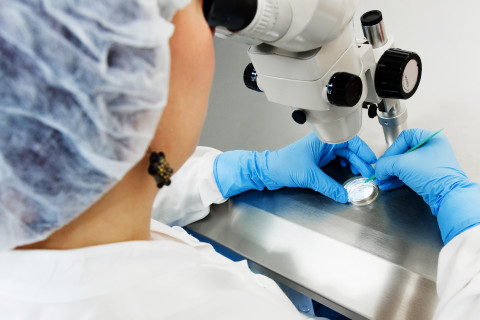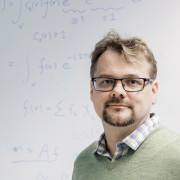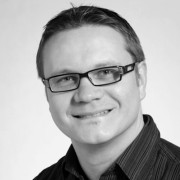Biocenter Kuopio was founded in 2007 to set up a multidisciplinary research network between different actors in the fields of molecular medicine and related drug research and biotechnology. The principal aim of Biocenter Kuopio is to promote the maintenance, use and development of the infrastructures related to medical and scientific research at the university.
Biocenter Kuopio comprises approximately 20 infrastructures or research groups that belong to the Faculty of Health Sciences and the Faculty of Science, Forestry and Technology at the University of Eastern Finland.
Technology platform services
Biocenter Kuopio offers technology services as part of Biocenter Finland in the following areas: bioinformatics, light and electron microscopy, mammalian model organisms, biological imaging, metabolomics, single cell genomics, stem cells, structural biology, and viral gene transfers. In addition, Biocenter Kuopio offers services for biomedical imaging (especially MRI and PET) and gene diagnostics.
Bioinformatics Center provides expert services and training in data analytics, method development, and data management. Bioinformatics Center maintains server infrastructure, and coordinates collaboration between researchers in various fields on bioinformatics issues. The servers are applicable for high performance computing, large-scale data management, and computing environments can also be customized to suit for different kind of requirements.
In the Faculty of Science, Forestry and Technology, SIB Labs services combine and market the university's expertise and equipment infrastructure, specialised equipment, related consultancy and analytical services, and applied research or development projects. These services are available to researchers and partners of the University (educational institutions, research institutes, companies).
Our field of expertise include (bio)material research and imaging technologies. For biomedical sciences, we provide e.g. electron microscopy (SEM, TEM, sample preparation), optical microspectroscopy (FTIR, Raman), X-ray tomography (microCT) and spectral imaging technology.
Our imaging core facility provides the instruments to image biological processes from tissues to single cells and subcellular molecular kinetics with both conventional and high-content methods. We offer personal user training and support for imaging of fixed or live tissues or cells, including consultation on experimental set up, sample preparation and image processing and analysis. The services include histology laboratory equipped with modern devices and services.
Kuopio Biomedical Imaging Unit (Kuopio-BIU) at A.I. Virtanen Institute for Molecular Sciences, UEF, provides excellent facilities for small animal in vivo MRI, PET and CT imaging as well as for ex vivo MRI microscopy in different areas of basic and applied research. Our facilities include four high-field (7-11.7 T) MRI scanners, a variable field simultaneous PET/MRI system (0.7 T, 3 T or 7 T) and a CT system for small animal imaging. Our services include helping in designing and performing the MRI and PET experiments and data analysis, as well as training in the equipment use. Kuopio-BIU is an European level infrastructure (ESFRI) as a part of EuroBiomaging Finnish Biomedical Imaging Node.
Genome Center of Eastern Finland provides gene diagnostic tests for solid tumors, monogenic diseases, and pharmacogenomics as well as multidisciplinary high quality research services. In the Gene Diagnostics Laboratory of the Genome Center, qualified personnel perform e.g. DNA and RNA sequencing (NGS/Sanger), genotyping, gene expression analyses, and related genetic data analytics by up-to-date instruments and techniques. Genome Center constantly improves its functions and services to serve customers at the best possible way.
The stem cell core facility of Biocenter Kuopio is a comprehensive provider of human pluripotent stem cell services at A.I. Virtanen Institute, Kuopio campus of the University of Eastern Finland. Our stem cell core operates on a fee-for-service basis and provides custom induced pluripotent stem cell (iPSC) derivation from somatic cells provided by the client. The standard cell type used is skin fibroblast. Special arrangements can be made for the reprogramming of other cell types. The reprogramming method is based on the four “Yamanaka factors” (OCT4, SOX2, KLF4 and C-MYC) and non-integrative Sendai-virus technology. We can also help with culture and maintenance of the cell lines and differentiation of the iPSCs into neurons, astrocytes and cardiomyocytes.
Phenotyping Center provides research services in neurophenotyping in mice and rats, and cardiovascular phenotyping on mice, rats, rabbits and pigs. Services include behavioral, electrophysiological and histopathological analyses as well as in vivo imaging. Research can be done on a special disease model organism provided by the client or on one of the special disease models provided by BCK group.
The LC-MS Metabolomics Center is a service unit within the Biocentre Kuopio, operating at the School of Pharmacy. The center is additionally integrated into the Finnish Biocentre's infrastructure network. The center offers an extensive array of analytical services utilizing chromatographic and mass spectrometric techniques, including method development and validation, result interpretation, and specialist training in analytical chemistry. The analytical methods are based on recent findings and include both untargeted and targeted approaches. Untargeted metabolomics, global metabolite profiling, and lipidomics utilize liquid chromatography and high-resolution mass spectrometry, while targeted quantitative techniques utilize gas and liquid chromatography with unit resolution mass spectrometers.
Structural biology technology platform offers versatile high-resolution mass spectrometry services for protein analytics. An important area is native mass spectrometry in which the mass of protein is measured in native, folded form. This technology can be used, for example, in measuring protein-protein, and protein-ligand complexes. We also determine three-dimensional structures of proteins by using X-ray diffraction (protein crystallography). and study their functional mechanisms.
Computer-aided drug design (CADD) is a part of modern and rational drug development process. In CADD, various computational methods are applied to speed up identification of new drug candidates, and to improve their properties. The drug design group utilizes both structure-based and ligand-based methods. They use various available and established molecular modeling methods such as docking, similarity searches, 3D-QSAR, pharmacophore modeling, homology modeling and molecular dynamics to identify novel hit compounds or optimize lead structures. Moreover, they study and evaluate the druggability of selected targets and aim to develop high-quality chemical probes useful for pharmacological studies and to identify new therapeutic strategies against cancer, antimicrobial drug design, age-related macular degeneration and method development in general.
The National Virus Vector Laboratory at the A.I. Virtanen Institute for Molecular Sciences produces quality-assured adeno, lenti, bakulo and AAV virus vectors not only on laboratory but also on a wider scale comprising two GMP level and three BSL2/BSL3 level laboratories with their bioreactors (10–100 L), incubators and laminars, vector concentration equipment, cell banks and measurement devices needed for characterisation.
The National Virus Vector Laboratory is part of the EU’s ESFRI infrastructure, and it has produced GMP level vectors for phase I-II clinical studies for European multicentre studies. Furthermore, over the past decade, the National Virus Vector Laboratory has also produced clinical grade vectors for preclinical purposes for more than a hundred customers in Finland, the EU and outside the EU.
Contact persons
- Director: Seppo Ylä-Herttuala
- Adenovirus vectors: Johanna Laakkonen
- Lentivirus vectors: Petri Mäkinen
- AAV vectors: Nihay Laham Karam
Single Cell Genomics core provides service in high-throughput single-cell RNA/ATAC-sequencing. In addition, we provide consultancy in study design and data analysis. Our technology is based on the nanodroplet-based Chromium™ Controller (10x Genomics) and Rhapsody (BD Biosciences) analysis system. The Single Cell Genomics core is located at A.I. Virtanen Institute for Molecular Sciences.
In vitro and ex vivo electrofysiology core has instrumentation for measurement of single cell electrical and functional properties, including combined fluorescence imaging and patch clamp / intracellular recording systems for cell cultures and tissue slices as well as multielectrode array platform for measurement of neuronal circuits. We provide services on Ca-imaging on cells and slices, patch-clamp experiments, intracellular voltage recordings, cellular and subcellular high speed confocal imaging of ions or voltage, extracellular voltage recordings (cell cultures, small tissues) and MEA (microelectrode array) measurements of network activities.
We offer personal training, help and guidance for experimental planning, tissue or cell processing and data analysis.
Multiscale biomechanics research infrastructure specializes in investigating biomechanical properties across all levels, from cellular to whole-body analysis. Equipped with cutting-edge mechanical and tribological testing tools, alongside expert knowledge, we offer comprehensive analysis of tissues and biomaterials. Our HUMEA Lab is dedicated to human motion capture and force measurement. Our proficiency in computational musculoskeletal and tissue biomechanical modeling enables us to uncover the complexities of biomechanics, providing valuable insights into the function of both human and animal bodies and their tissues across diverse scales.
Faculty of Health Sciences coordinates the multidisciplinary entity.
- Basic, Translational and Clinical Cardiovascular Medicine (CVD)
- Drug Discovery and Delivery Technologies (DrugTech)
- Forests and Bioeconomy (FOBI)
- Metabolic Diseases (METABOLICS)
- Multidisciplinary Cancer Research (CANCER)
- Musculoskeletal Diseases (MSD)
- Neuroscience (NEURO)
- Photonics (PHOTONICS)
- Sustainable Co-management of Water Resources and Aquatic Environments (WATER)
- Biocenter Finland is a distributed nation-wide life science research infrastructure of the five Biocenters in Finland.
- Structural Biology Finland (FINStruct) provides integrated structural biology services and training to support research and innovation in life science.
- ELIXIR coordinates life science resources (e.g. databases, software tools, training materials, cloud storage and supercomputers) so that they form a single infrastructure.
- European Research Infrastructure Consortium (ERIC)
- Euro-BioImaging is a research infrastructure that offers open access to imaging technologies, training and data services in biological and biomedical imaging.
- EU-OPENSCREEN integrates high-capacity screening platforms throughout Europe.
- European Infrastructure for Translational Medicine (EATRIS) focuses on preclinical and early clinical development of drugs, vaccines and diagnostics.
- Instruct-ERIC is a pan-European research infrastructure in structural biology, making high-end technologies and methods available to all European researchers.































